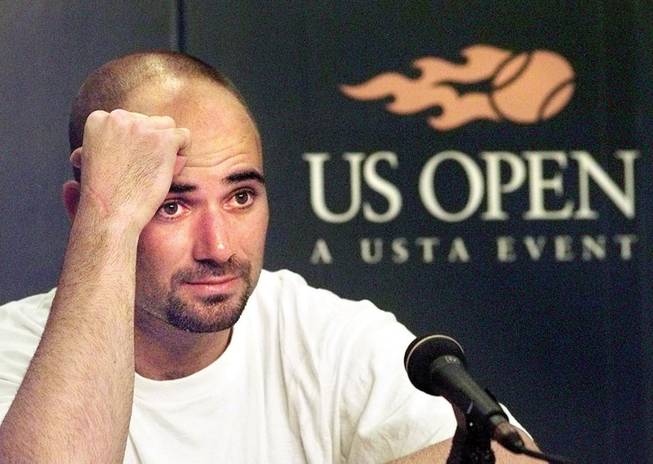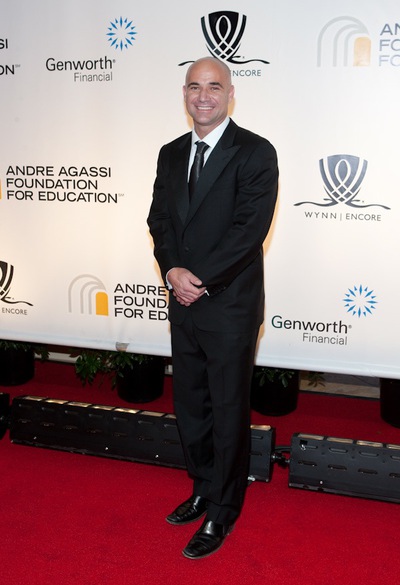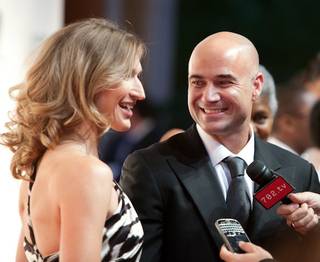
associated press file
Andre Agassi speaks after a loss at the 1997 U.S. Open in New York. His autobiography contains an admission that he used crystal meth that year.
Thursday, Oct. 29, 2009 | 6:25 p.m.
Even a week ago, considering Andre Agassi as a spokesman fighting the battle against the dangers of methamphetamine use made about as much sense as expecting him to teach a bocce lesson. But the climate around Agassi swiftly changed this week as details have poured out of his book “Open” that he used crystal meth in 1997, the year after he’d won a gold medal at the Summer Olympics in Atlanta. That also was the year Agassi mystified the tennis world by falling to No. 141 in the world rankings.
Agassi says in the book, written by Pulitzer Prize winner J.R. Moehringer and to be released Wednesday, that he used the drug dozens of times that year and escaped a doping suspension for a positive test by writing a letter to ATP tour officials that he unwittingly ingested the drug by drinking a soda spiked with meth by his assistant, Slim. (The mishandling of the test has prompted action by the World Anti-Doping Agency, which is asking the ATP tour to explain how Agassi tested positive for meth, yet was never punished). The account from the book, as reported by the London-based Times: “Slim dumps a small pile of powder on the coffee table. He cuts it, snorts it. He cuts it again. I snort some. I ease back on the couch and consider the Rubicon I’ve just crossed.”
Speaking to his past use of the highly addictive and readily obtainable drug, Agassi is quoted in the new issue of People magazine as saying, “I can’t speak to addiction, but a lot of people would say that if you're using anything as an escape, you have a problem.”
But Agassi could actually serve (an ace, if you need a more overt tennis term) as an example of how anyone can fall pretty to the destructive nature of methamphetamine, says Nevada first lady Dawn Gibbons, who in January 2007 launched the Crystal Darkness program to fight methamphetamine abuse and has seen that program expand across 27 states and Mexico.
The first lady, whose acrimonious divorce case with Gov. Jim Gibbons goes to trial in December, remains a member of Attorney General Catherine Cortez Masto’s Governor’s Working Group on Methamphetamine Use. Thus, she was eager to speak about Agassi’s out-of-left-field disclosure.
“It’s huge. It’s shocking, but it is also very courageous,” Gibbons said today during a phone conversation from Carson City. “I’m still in shock about it. It makes you realize how horrible the problem is. It’s a very positive sign, a gift really, if you think of how by writing it in his memoir, he might help a lot more people. He would be a great speaker on this issue.”
Would she consider actually reaching out to Agassi to assume that role?
“Absolutely,” Gibbons said. “People love him. He’s done so many good things with his life. He’s got great credibility. People will be able to connect even more now that he’s had a crisis of his own. … If it can happen to him, it can happen to anyone in our family.”
Gibbons reminded that, “President Clinton declared that methamphetamine was the worst drug problem in our nation, and we need to do everything in our power to fight it. Nobody paid attention. Then President Obama said recently that it would be the No. 1 addiction worldwide within five years, so it’s incumbent on us to continue to wage a campaign against it.”
How open Agassi would be to accepting such a responsibility is open to question, of course, given how long ago his admitted use occurred. Regardless, Gibbons says, “I admire him for coming forward. He could be so effective in helping people.”
Political aspirations damaged?
As recently as last month, at his 14th Annual Grand Slam for Children benefit at Wynn Las Vegas, Agassi reiterated his interest in someday running for public office -- but not today. In a conversation today with someone who, as they say, forgets more about politics than I’ll ever know, I asked how the drug disclosure in “Open” would affect Agassi’s political aspirations. One school of thought is that he might have achieved what Obama managed in disclosing past drug use in his own memoirs, inoculating himself from any disclosures during campaigns for public office by simply pointing to his own written accounts. But I was told that campaign managers would not treat Agassi’s case in the same hands-off way, as the tennis star was long past his formative, experimental teenage years during the period he admits using recreational drugs. The fact that Agassi -- admittedly -- lied to his sport’s governing body about the transgression to avoid penalty could make a powerful campaign ad. As this person said, it is very early to predict how it would play out, but added that an opposing operative would have no problem using the book’s more damning drug disclosures against Agassi.
Follow John Katsilometes on Twitter at twitter.com/JohnnyKats.




Join the Discussion:
Check this out for a full explanation of our conversion to the LiveFyre commenting system and instructions on how to sign up for an account.
Full comments policy